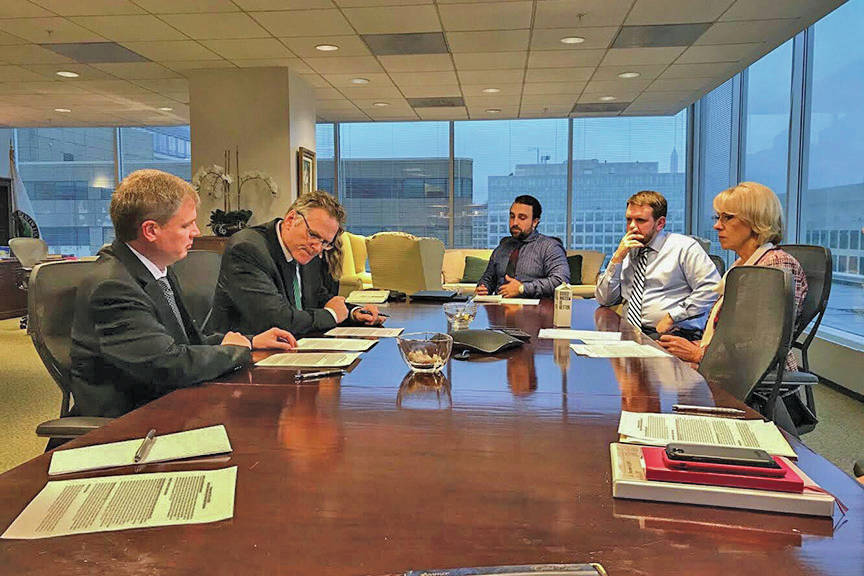Gov. Mike Dunleavy was in Washington, D.C. last week, giving speeches, attending meetings with administration officials and appearing on TV.
Dunleavy had a busy day last Monday joining a roundtable discussion with President Donald Trump, meeting with Education Secretary Betsy DeVos and speaking at the conservative think tank, the Heritage Foundation.
Dunleavy joined several other Republican governors and lawmakers to meet with the president and Vice President Mike Pence about the economic benefits of lifting federal regulations.
“We’re talking about a lot of deregulation. We’re talking about various tax cuts and various tax incentives so they continue onward with what they’re doing,” Trump said in reference to the governors and state legislators in the room, as recorded in a C-SPAN video of the meeting.
Governors from Alaska, Arkansas, Idaho, Indiana, Nebraska and South Dakota as well as the governor-elect of Mississippi praised the president for removing a number of federal regulations they say hurt jobs and the economy. Many of the removed regulations discussed were environmental regulations concerning oil and natural gas.
Dunleavy too thanked the governor for helping to deregulate industries in Alaska.
“I can’t think of a president that’s helped Alaska more than you have,” Dunleavy told the president during the discussion. “Trying to deregulate a number of the projects that we’ve been working on, helping us gain a leg up again to be one of the top energy-producing states in the country.”
Dunleavy again praised the president when he appeared on CNBC’s “Squawk Box.” Speaking to host Rebecca Quick, Dunleavy said Trump’s recent tentative trade agreement with China will be good for Alaska.
On Dec. 13, officials from the U.S. and China announced they had reached the first phase of an initial deal after two years of trade war. The deal, which has not yet been signed, would require China to purchase large amounts of American agricultural goods. Seafood, much of which is produced in Alaska, is included in that agreement.
The trade agreement, “is going to be good for Alaska,” Dunleavy said on the show, mentioning Alaska’s seafood industry. A fact sheet from the president’s office said the trade deal will result in a “dramatic expansion of U.S. food, agriculture and seafood product exports, increasing American farm and fishery income.”
When asked about the ongoing impeachment process, Dunleavy said that he and most Alaskans supported the president.
“He’s been good for this country,” Dunleavy said, noting high stock market numbers and low unemployment. “It’s going to be hard for folks on the left to convince people this president should be impeached. The economic indicators, they’re hard to beat.”
Quick asked the governor about the recall effort he’s facing.
Dunleavy said both the impeachment and his recall were being pushed by people unhappy with the outcome of the elections.
“To some extent, this impeachment and the recall effort up in Alaska is a distraction from doing business for the people,” Dunleavy said.
Meeting with DeVos
Today Alaska Education Commissioner Michael Johnson and I met with @BetsyDeVosED about how we can partner with her to improve reading, increase charter schools, and compact with tribal entities in rural Alaska. pic.twitter.com/yc7XZr886h
— Governor Mike Dunleavy (@GovDunleavy) December 16, 2019
The governor tweeted about his meeting with DeVos, saying he and Alaska Education Commissioner Michael Johnson discussed how they can partner to improve education outcomes in Alaska.
Dunleavy said he and Johnson met with DeVos about how to “improve reading, increase charter schools and compact with tribal entities in rural Alaska.”
When the governor released his budget on Dec. 11, he said his administration would be rolling out policy initiatives in the near future.
In an email, Dunleavy spokesperson Jeff Turner said the governor was speaking with DeVos about how the state and federal government could “partner up” to improve education in Alaska. Turner did not respond to follow-up questions asking for elaboration on exactly what that meant.
Turner wrote that policy initiatives being considered by the Dunleavy administration were increasing reading proficiency by third grade and algebra proficiency by eighth grade. The administration would also be looking at tribal compacting education in rural Alaska.
Tribal compacting is an agreement between the state and tribal governments in which Alaska Native governments would operate and oversee K-12 education in certain communities. It’s unclear what role the federal government would play in the governor’s initiatives.
• Contact reporter Peter Segall at 523-2228 or psegall@juneauempire.com.


